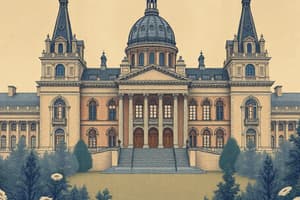Podcast
Questions and Answers
What is politics?
What is politics?
Politics is a complex web of dynamics and decision-making processes that shape society and determine the future.
When did politics begin?
When did politics begin?
Politics has existed since the dawn of civilization, constantly evolving in response to societal shifts.
Which ancient societies developed democracy and republicanism?
Which ancient societies developed democracy and republicanism?
Societies like Greece and Rome developed democracy and republicanism.
Who were some philosophers from the Enlightenment period known for their political ideas?
Who were some philosophers from the Enlightenment period known for their political ideas?
What shaped the modern age of politics?
What shaped the modern age of politics?
What is the main difference between democracy and authoritarianism?
What is the main difference between democracy and authoritarianism?
How do political parties serve as a link between the people and the government?
How do political parties serve as a link between the people and the government?
What is the role of political ideologies in guiding parties and leaders?
What is the role of political ideologies in guiding parties and leaders?
What is the definition of political power?
What is the definition of political power?
What do interest groups do in politics?
What do interest groups do in politics?
Flashcards are hidden until you start studying
Study Notes
Navigating the World of Politics
Politics, at its core, is a complex web of dynamics and decision-making processes that shape our society and determine the future. As you delve into this multifaceted field, let's explore its history, functions, and the fundamental concepts that help us understand the world around us.
A Brief History of Politics
Politics has existed since the dawn of civilization, constantly evolving in response to societal shifts. Early forms of government emerged as tribes and communities sought to organize themselves, often led by chiefs, councils, or kings. In the ancient world, societies like Greece and Rome developed democracy and republicanism, which later influenced Western political systems.
The Enlightenment period in the 18th century brought forth new thinking about politics, with philosophers like John Locke and Jean-Jacques Rousseau arguing for the rights and liberties of the individual. The growth of industrialization and the rise of nation-states, along with the French Revolution, shaped the modern age of politics.
Today, we see a more interconnected world, with globalization, multilateral organizations, and international politics playing a role in shaping national and international agendas.
Function and Types of Politics
Politics aims to improve society and guarantee the well-being of its citizens. Political systems are designed to organize and regulate activities, and they often fall into three categories:
- Democracy: In democratic systems, power is held by the people, either directly or through representatives, and governments are held accountable through elections.
- Authoritarianism: In authoritarian systems, power is held by an individual or a small group, often with little or no accountability to the people.
- Combination systems: Many countries have hybrid systems that incorporate elements of democracy and authoritarianism, such as China's authoritarian one-party system with some democratic elements.
Key Concepts and Actors in Politics
Understanding the fundamental concepts and actors within politics is crucial to making sense of the world around us:
- Political parties: Political parties formulate and promote policies, platforms, and ideologies to win elections and govern. They serve as the link between the people and the government.
- Political ideologies: Ideologies guide political parties and leaders by providing a framework for understanding the world and proposing solutions to social and economic problems.
- Political power: Power is the ability to influence, control, or decide. Power struggles are common in politics, with leaders jockeying for control and citizens seeking to have their voices heard.
- Political representation: Representatives work on behalf of their constituents, advocating for their needs, and making decisions on their behalf.
- Interest groups: Interest groups are organizations that represent the interests of specific groups, such as labor unions, businesses, or environmental organizations. They work to influence policy and legislation.
Politics and You
Politics affects every aspect of our lives, from the air we breathe to the education our children receive. It's crucial to stay informed and engaged in the political process, whether through voting, volunteering, or advocating for the issues that matter to you. By understanding the history, functions, and actors in politics, you can become a more informed and engaged citizen, and help shape the future of our world.
Remember, politics is a complex field, and it's essential to approach it with an open mind and a willingness to learn. By doing so, you'll not only be better equipped to understand the world around you but also to make a positive difference in your community and the world at large.
Studying That Suits You
Use AI to generate personalized quizzes and flashcards to suit your learning preferences.




